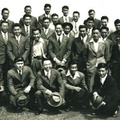My Dad was working as a gardener when I was born. Then, when I was in first grade, he dropped his gardening work to establish a fruit-stand business, which was just starting to do well when Pearl Harbor was attacked. We lost everything when they sent us to Heart Mountain. After the war he went back into gardening because it was cheaper to buy a lawn mower and pick up a few jobs than to invest in another business. I reluctantly joined my dad and worked as his helper for a while. We argued, because he had that work ethic of slaving away for peanuts, while I would think, “They threw us in the camps, and now they expect us to mow their lawns?”
I didn’t like the work initially. I didn’t want anything to do with it, but out of desperation I was pushing a lawn mower like everyone else. You see, it’s not that we were particularly attracted to gardening. The timing worked out: the Japanese fresh out of camp didn’t have that much choice. Gardening was very convenient and easy work to get into. You weren’t out in public—and at that time we weren’t very popular.
In the mid-1950s, after six years of gardening, I decided to study horticulture and then landscape architecture at Cal Poly Pomona. In my second year of school, a Beverly Hills landscape architect saw my work and offered me a job. He had a clientele that included a lot of celebrities, so there I was, working on movie stars’ houses. I couldn’t believe I could get paid twice as much for sitting in an air-conditioned office as I did mowing lawns—it seemed so unreal. Later I joined the office of Garrett Eckbo, a person I greatly admired because of his commitment to the idea that landscape design should serve the everyday needs of common people, not just the elite. In 1968 I started my own practice.
I believe that landscape architecture is the conceptualization of an idea within the context of a specific environment. The landscape contractor installs the concept and gives it form. It is the role of the gardener to nurture it, and over time, to guide it to what it was intended to be. A well-composed garden is an environmental endeavor, a horticultural endeavor, a social endeavor, a humanitarian endeavor, and an artistic endeavor—all of which entice our physical senses while soothing our souls.
* This article originally appeared in the Winter 2006 issue of the Japanese American National Museum Member Magazine in conjunction with the exhibition Landscaping America: Beyond the Japanese Garden.
© 2006 Japanese American National Museum





